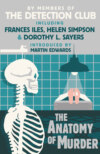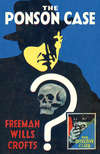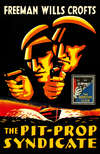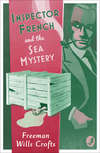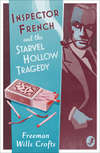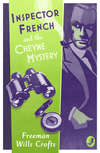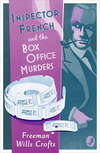Loe raamatut: «Inspector French’s Greatest Case»

Copyright
Published by COLLINS CRIME CLUB
An imprint of HarperCollinsPublishers Ltd
1 London Bridge Street
London SE1 9GF
First published in Great Britain by Wm Collins Sons & Co. Ltd 1924
Copyright © Estate of Freeman Wills Crofts 1924
Introduction © Estate of Freeman Wills Crofts 1937
Cover design by Mike Topping © HarperCollinsPublishers Ltd 2016
A catalogue copy of this book is available from the British Library.
This novel is entirely a work of fiction. The names, characters and incidents portrayed in it are the work of the author’s imagination. Any resemblance to actual persons, living or dead, events or localities is entirely coincidental.
All rights reserved under International and Pan-American Copyright Conventions. By payment of the required fees, you have been granted the non-exclusive, non-transferable right to access and read the text of this e-book on screen. No part of this text may be reproduced, transmitted, down-loaded, decompiled, reverse engineered, or stored in or introduced into any information storage and retrieval system, in any form or by any means, whether electronic or mechanical, now known or hereinafter invented, without the express written permission of HarperCollins.
Source ISBN: 9780008190583
Ebook Edition © November 2016 ISBN: 9780008190590
Version: 2018-08-17
Contents
Cover
Title Page
Copyright
Introduction
1. Murder!
2. The Firm of Duke and Peabody
3. Gathering the Threads
4. Missing
5. French Takes a Journey
6. The Hotel in Barcelona
7. Concerning a Wedding
8. Sylvia and Harrington
9. Mrs Root of Pittsburg
10. Some Pairs of Blankets
11. A Deal in Jewellery
12. The Elusive Mrs X
13. Mrs French Takes a Notion
14. Tragedy
15. The House in St John’s Wood
16. A Hot Scent
17. A Deal in Stocks
18. The S.S. ‘Enoch’
19. French Propounds a Riddle
20. Conclusion
About the Author
Also in this Series
About the Publisher
INTRODUCTION
Meet Chief-Inspector French
I have been asked to tell you something about Chief-Inspector Joseph French of the Criminal Investigation Department of New Scotland Yard. I shall do my best, but I thought it would give you a better idea of him if I were to bring the man himself to the microphone. So with a good deal of trouble I have persuaded him to come, and he’ll speak to you himself. But I have put him in the next room for the moment, lest his ears should burn from my introduction.
As he’s not here, then, I may say that he’s really quite a good fellow at heart. He’s decent and he’s straight and he’s as kindly as his job will allow. He believes that if you treat people decently—you’ll be able to get more out of them; and he acts on his belief. Politeness is an obsession with him, and he has well earned his nickname of ‘Soapy Joe.’ He’s far from perfect, but I have known him now for many years, and I don’t wish for a better friend.
But I have to admit that he’s not very brilliant: in fact, many people call him dull. And here I’ll let you into secret history. Anyone about to perpetrate a detective novel must first decide whether his detective is to be brilliant and a ‘character,’ or a mere ordinary humdrum personality. When French came into being there seemed two good reasons for making him the second of these. One was that it represented a new departure; there were already plenty of ‘character’ detectives, the lineal descendants, most of them, of the great Sherlock. The other reason was much more important. Striking characteristics, consistently depicted, are very hard to do.
I tried therefore to make French a perfectly ordinary man, without peculiarities or mannerisms. Of course he had to have some qualities, but they were to be the ordinary qualities of ordinary fairly successful men. He was to have thoroughness and perseverance as well as a reasonable amount of intelligence: just the qualities which make for moderate success in any walk of life.
From this it follows that he does not leap to his conclusions by brilliant intuition. He begins a case by going and looking for information in those places in which he thinks information is most likely to be found. When he gets the information he swots over it until he grinds out some sort of theory to account for the facts. Very often this turns out to be wrong, but if so, he simply tries again till he thinks of something better.
French I made an inspector of the Yard rather than a private detective because I hoped in this way to gain realism. But at once a horrible difficulty loomed up: I knew nothing about Scotland Yard or the C.I.D. What was to be done? The answer was simple. I built on the great rock which sustains so many of my profession: if I knew nothing of my subject, well, few of my readers would know any more.
As a matter of fact I have found this rock not quite so steadfast as I had hoped. It has been pointed out to me that French has at times done things which would make a real inspector of the Yard shudder. He has consistently travelled first-class on railways, particularly in sleeping-cars. He has borrowed bicycles from local police-officers without paying for their hire. He has undertaken country inquiries without his attendant sergeant. And many other evil things has he done. Fortunately, now that he has become a chief-inspector he is seeing the error of at least some of his ways and being more careful to live up to his great traditions.
French is a home bird, and nothing pleases him more than to get into his slippers before the fire and bury himself in some novel of sea adventure. He is married, but unlike Dr Watson he is the husband of only one wife. On occasion his Emily helps him with his cases. But this is only when he is more utterly stuck than usual. Otherwise he doesn’t think it decent—or perhaps worthwhile—to worry her with shop. I have been wondering whether he has children. It’s like a dream to me that in one book children were mentioned, and that in another their existence was denied. But as I can’t find either reference, I can only note the point as one to be avoided.
French’s job at the Yard is distinctly comfortable, particularly since he was made a chief-inspector. His promotion was decided on for a somewhat unusual reason. It was not because of his work or of what his superiors thought of him, but because so many people mentioned in letters that his promotion was long overdue. The customer, of course, is always right.
Not only, indeed, is French’s job at the Yard comfortable, but he enjoys very considerable advantages over his colleagues. Two in particular are so striking as to give him an almost unique position.
The first is that he must necessarily succeed in his cases. He may become utterly discouraged and pessimistic—indeed, he does so at regular intervals. This, however, is merely a concession to the reader, who must often be feeling equally bored and wearied. But if French is discouraged it is his own fault. He knows very well—or he would know if he applied his own methods of reasoning—that he wouldn’t have been put into a book if he were going to fail. Success does not come at once—the value of suspense in a book cannot be overlooked—but that it will come, and that not later than about page three hundred, he is well aware.
His second great advantage over his colleagues really arises out of the first. It is that definitely he will find all the clues that he wants. He is bound to find them, because they have been laid down specially for that purpose, and he is led up to them in such a way that he could not avoid seeing them even if he wished to. These clues which he will find, moreover, are exactly those which lead to the solution of his problem, though naturally he does not see this at first. A decent interval always occurs between the picking up of the clue and the realization of its significance. This is necessary, as otherwise the book would run out too short.
This plan of finding just the clues necessary to lead the investigator to the correct conclusion seems to me such an extraordinarily good way of conducting an inquiry that I offer the idea, quite freely, to the heads of Scotland Yard.
I said that French had two advantages over his colleagues at the Yard, but really he has three. He cannot be killed. He cannot even be seriously injured. The reason, of course, is that he will be wanted for the next book. So if anyone fills the room with petrol vapour and attempts to light it, as was done at Newhaven, French will, if he thinks hard, know that either the person will not light the petrol, or that if he does it won’t burn. If the criminal he is attempting to arrest withdraws the pin from a Mills’s bomb he is carrying he will know, again if he thinks, that either he will be able to hold the lever down, or that the bomb will prove a dud. Of course, under such distressing circumstances he never does think, as otherwise he couldn’t register the amount of terror which is the reader’s right and proper due.
I’m afraid I’ve talked too much about French, but it’s really because I think a lot of him. However, with your permission I’ll call him now. I give a shout that would wake the dead, and he appears.
‘Yes, what is it?’ he asks.
‘Speak to these good folk, will you?’ I say.
He approaches the microphone in a hesitating way and, clearing his throat, begins deprecatingly: ‘Well, I’m very glad to be able to talk to all these kind friends, and to say it’s a proud day in my life when—’
I stop him. Goodness knows where he would otherwise get to. I ask him to tell how he solves his cases.
This is more in his line. He gives a little laugh, and starts off in his normal voice.
‘Huh, yes, I can do that. The answer is that I don’t—not always. But I’ll tell you ladies and gentlemen how I make things look pretty well: I just don’t mention the failures. Sir Mortimer and the boys at the Yard may know about them—as a matter of fact, they do; but you don’t. That’s my thoughtfulness for you, of course: I don’t want to worry you with anything that’s not just absolutely so.’
‘But,’ I tell him, ‘you know you usually do succeed. They would like to hear your methods.’
‘Well,’ he explains, ‘I have two principal ways. Either I get a good clue or I have a stroke of luck. And you may take it from me that the luck’s the best way. It saves endless trouble and difficulty.’
The stream of his inspiration seems to come to an end, and I start him off again.
‘You’ve been in one or two tight corners,’ I suggest. ‘You might tell them about your worst five minutes.’
He warms to it. ‘At the Yard we do get occasional nasty turns, but of course they’re all in the day’s work. Since you’ve asked me, I think my worst was in the case I just heard you speak of—Did you know the door wasn’t shut? I mean the case in which two financiers were murdered on an abandoned yacht off Newhaven, and a lot of diamonds were missing. You may remember it. Well, a man called Nolan was my suspect, though I couldn’t prove his guilt. But I thought there was just a chance that I might be able to make him commit himself. So I laid a trap for him. I pitched him a yarn that made him think he’d left a clue on his launch, in the hope that he’d try to destroy the launch and we could take him in the act.
‘The launch was lying in Newhaven Harbour, and the next night Sergeant Carter and I took cover on the wharf and settled down to watch. It was a wet night, and we got our fill of it. But it was worth it. About three in the morning we saw Nolan creeping down and slipping aboard. We followed him as close as we dared. He disappeared into the little engine-room. I crept after him to the door and peeped in. He was working with a torch, and you can imagine my feelings when I watched him take the missing diamonds from a hiding-place and put them in his pocket. This, of course, was all the proof I could have wanted. But then things grew nasty. He flooded the place with petrol and put a canister on the floor with a clock attached. So I thought it was about time to make a move.
‘As a matter of fact, it was past the time. Before I could do anything he had flashed his torch on me, and I found myself looking into the wrong end of a pistol. He spoke quite quietly. He said he had feared a trick, but that he had gone through with the thing on chance. He said that as long as I lived he was in danger of being hanged. Therefore he was going to kill me. If he could get away afterwards himself, he would; if not, we would die together.
‘You’ll understand that I could do nothing, for if I’d made a move he’d have fired, and if he’d fired, the whole place would have gone up in a sheet of flame. It was nasty, and no mistake.’
French pauses, and I prompt him again.
‘Tell them how you escaped.’
‘Ah, that was where my bit of luck came in. Carter was behind me, and Nolan didn’t see him. So Carter nipped on deck, lowered himself over the side, and shot Nolan through the porthole. He got him in the hand, but the flame from the gun didn’t get in, so there was no fire. But Nolan was desperate, and in spite of his wound he went for me all out. I tripped over a pipe and fell with my side against the motor. I broke some ribs, but managed to hold off Nolan till Carter got back and pulled him off.’
‘And after that you think you can be killed! French, my dear fellow, you’re a humbug!’
He grins, and indicates pointedly that he is now due at the Yard. So I have to let him go.
FREEMAN WILLS CROFTS
1935
1
Murder!
The back streets surrounding Hatton Garden, in the City of London, do not form at the best of times a cheerful or inspiring prospect. Narrow and mean, and flanked with ugly, sordid-looking buildings grimy from exposure to the smoke and fogs of the town and drab from the want of fresh paint, they can hardly fail to strike discouragement into the heart of anyone eager for the uplift of our twentieth century civilisation.
But if on a day of cheerful sunshine the outlook is thus melancholy, it was vastly more so at ten o’clock on a certain dreary evening in mid-November. A watery moon, only partially visible through a damp mist, lit up pallidly the squalid, shuttered fronts of the houses. The air was cold and raw, and the pavements showed dark from a fine rain which had fallen some time earlier, but which had now ceased. Few were abroad, and no one whose business permitted it remained out of doors.
Huckley Street, one of the narrowest and least inviting in the district, was, indeed, deserted save for a single figure. Though the higher and more ethical side of civilisation was not obtrusive, it was by no means absent. The figure represented Law and Order, in short, it was that of a policeman on his beat.
Constable James Alcorn moved slowly forward, glancing mechanically but with practised eye over the shuttered windows of the shops and the closed doors of the offices and warehouses in his purview. He was not imaginative, the constable, or he would have rebelled even more strongly than he did against the weariness and monotony of his job. A dog’s life, this of night patrol in the City, he thought, as he stopped at a cross roads, and looked down each one in turn of the four dingy and deserted lanes which radiated from the intersection. How deadly depressing it all was! Nothing ever doing! Nothing to give a man a chance! In the daytime it was not so bad, when the streets were alive and fellow creatures were to be seen, if not spoken to, but at night when there was no one to watch, and nothing to be done but wait endlessly for the opportunity which never came, it was a thankless task. He was fed up!
But though he didn’t know it, his chance was at hand. He had passed through Charles Street and had turned into Hatton Garden itself, when suddenly a door swung open a little way down the street, and a young man ran wildly out into the night.
The door was directly under a street lamp, and Alcorn could see that the youth’s features were frozen into an expression of horror and alarm. He hovered for a moment irresolute, then, seeing the constable, made for him at a run.
‘Officer!’ he shouted. ‘Come here quickly. There’s something wrong!’
Alcorn, his depression gone, hurried to meet him.
‘What is it?’ he queried. ‘What’s the matter?’
‘Murder, I’m afraid,’ the other cried. ‘Up in the office. Come and see.’
The door from which the young man had emerged stood open, and they hastened thither. It gave on a staircase upon which the electric light was turned on. The young man raced up and passed through a door on the first landing. Alcorn, following, found himself in an office containing three or four desks. A further door leading to an inner room stood open, and to this the young man pointed.
‘In there,’ he directed; ‘in the Chief’s room.’
Here also the light was on, and as Alcorn passed in, he saw that he was indeed in the presence of tragedy, and he stood for a moment motionless, taking in his surroundings.
The room was small, but well proportioned. Near the window stood a roll-top desk of old-fashioned design. A leather-lined clients’ arm-chair was close by, with behind it a well-filled bookcase. In the fireplace the remains of a fire still glowed red. A table littered with books and papers and a large Milner safe completed the furniture. The doors of this safe were open.
Alcorn mechanically noted these details, but it was not on them that his attention was first concentrated. Before the safe lay the body of a man, hunched forward in a heap, as if he had collapsed when stooping to take something out. Though the face was hidden, there was that in the attitude which left no doubt that he was dead. And the cause of death was equally obvious. On the back of the bald head, just above the fringe of white hair, was an ugly wound, as if from a blow of some blunt but heavy weapon.
With an oath, Alcorn stepped forward and touched the cheek.
‘Cold,’ he exclaimed. ‘He must have been dead some time. When did you find him?’
‘Just now,’ the young man answered. ‘I came in for a book, and found him lying there. I ran for help at once.’
The constable nodded.
‘We’d best have a doctor anyway,’ he decided. A telephone stood on the top of the desk, and he called up his headquarters, asking that an officer and a doctor be sent at once. Then he turned to his companion.
‘Now, sir, what’s all this about? Who are you, and how do you come to be here?’
The young man, though obviously agitated and ill at ease, answered collectedly enough.
‘My name is Orchard, William Orchard, and I am a clerk in this office—Duke & Peabody’s, diamond merchants. As I have just said, I called in for a book I had forgotten, and I found—what you see.’
‘And what did you do?’
‘Do? I did what anyone else would have done in the same circumstances. I looked to see if Mr Gething was dead, and when I saw he was I didn’t touch the body, but ran for help. You were the first person I saw.’
‘Mr Gething?’ the constable repeated sharply. ‘Then you know the dead man?’
‘Yes. It is Mr Gething, our head clerk.’
‘What about the safe? Is there anything missing from that?’
‘I don’t know,’ the young man answered. ‘I believe there were a lot of diamonds in it, but I don’t know what amount, and I’ve not looked what’s there now.’
‘Who would know about it?’
‘I don’t suppose anyone but Mr Duke, now Mr Gething’s dead. He’s the chief, the only partner I’ve ever seen.’
Constable Alcorn paused, evidently at a loss as to his next move. Finally, following precedent, he took a somewhat dog’s-eared notebook from his pocket, and with a stumpy pencil began to note the particulars he had gleaned.
‘Gething, you say the dead man’s name was? What was his first name?’
‘Charles.’
‘Charles Gething, deceased,’ the constable repeated presently, evidently reading his entry. ‘Yes. And his address?’
‘12 Monkton Street, Fulham.’
‘Twelve—Monkton—Street—Fulham. Yes. And your name is William Orchard?’
Slowly the tedious catechism proceeded. The two men formed a contrast. Alcorn calm and matter of fact, though breathing heavily from the effort of writing, was concerned only with making a satisfactory statement for his superior. His informant, on the other hand, was quivering with suppressed excitement, and acutely conscious of the silent and motionless form on the floor. Poor old Gething! A kindly old fellow, if ever there was one! It seemed a shame to let his body lie there in that shapeless heap, without showing even the respect of covering the injured head with a handkerchief. But the matter was out of his hands. The police would follow their own methods, and he, Orchard, could not interfere.
Some ten minutes passed of question, answer, and laborious calligraphy, then voices and steps were heard on the stairs, and four men entered the room.
‘What’s all this, Alcorn?’ cried the first, a stout, cleanshaven man with the obvious stamp of authority, in the same phrase that his subordinate had used to the clerk, Orchard. He had stopped just inside the door, and stood looking sharply round the room, his glance passing from the constable to the body, to the open safe, with inimical interest to the young clerk, and back again to Alcorn.
The constable stiffened to attention, and replied in a stolid, unemotional tone, as if reciting formal evidence in court.
‘I was on my beat, sir, and at about ten-fifteen was just turning the corner from Charles Street into Hatton Garden, when I observed this young man,’ he indicated Orchard with a gesture, ‘run out of the door of this house. He called me that there was something wrong up here, and I came up to see, and found that body lying as you see it. Nothing has been touched, but I have got some information here for you.’ He held up the notebook.
The newcomer nodded and turned to one of his companions, a tall man with the unmistakable stamp of the medical practitioner.
‘If you can satisfy yourself the man’s dead, Doctor, I don’t think we shall disturb the body in the meantime. It’ll probably be a case for the Yard, and if so we’ll leave everything for whoever they send.’
The doctor crossed the room and knelt by the remains.
‘He’s dead all right,’ he announced, ‘and not so long ago either. If I could turn the body over I could tell you more about that. But I’ll leave it if you like.’
‘Yes, leave it for the moment, if you please. Now, Alcorn, what else do you know?’
A few seconds sufficed to put the constable’s information at his superior’s disposal. The latter turned to the doctor.
‘There’s more than murder here, Dr Jordan, I’ll be bound. That safe is the key to the affair. Thank the Lord, it’ll be a job for the Yard. I shall ’phone them now, and there should be a man here in half an hour. Sorry, Doctor, but I’m afraid you’ll have to wait.’ He turned to Orchard. ‘You’ll have to wait, too, young man, but the Yard inspector probably won’t keep you long. Now, what about this old man’s family? Was he married?’
‘Yes, but his wife is an invalid, bedridden. He has two daughters. One lives at home and keeps house, the other is married and lives somewhere in town.’
‘We shall have to send round word. You go, Carson.’ He turned to one of the two other members of his quartet, constables in uniform. ‘Don’t tell the old lady. If the daughter’s not there, wait until she comes in. And put yourself at her disposal. If she wants her sister sent for, you go. You, Jackson, go down to the front door and let the Yard man up. Alcorn, remain here.’ These dispositions made, he rang up the Yard and delivered his message, then turned once more to the young clerk.
‘You say, Mr Orchard, that no one could tell what, if anything, is missing from the safe, except Mr Duke, the sole active partner. We ought to have Mr Duke here at once. Is he on the ’phone?’
‘Gerard, 1417B,’ Orchard answered promptly. The young man’s agitation had somewhat subsided, and he was following with interest the actions of the police, and admiring the confident, competent way in which they had taken charge.
The official once again took down the receiver from the top of the desk, and put through the call. ‘Is Mr Duke there? … Yes, say a superintendent of police.’ There was a short silence, and then the man went on. ‘Is that Mr Duke? … I’m speaking from your office in Hatton Garden. I’m sorry, sir, to tell you that a tragedy has taken place here. Your chief clerk, Mr Gething, is dead … Yes, sir. He’s lying in your private office here, and the circumstances point to murder. The safe is standing open, and—Yes, sir, I’m afraid so—I don’t know, of course, about the contents … No, but you couldn’t tell from that … I was going to suggest that you come down at once. I’ve ’phoned Scotland Yard for a man … Very good, sir, we shall be here when you come.’ He replaced the receiver and turned to the others.
‘Mr Duke is coming down at once. There is no use in our standing here. Come to the outer office and we’ll find ourselves chairs.’
It was cold in the general office, the fire evidently having been out for some time, but they sat down there to wait, the superintendent pointing out that the furniture in the other room must not be touched. Of the four, only the superintendent seemed at ease and self-satisfied. Orchard was visibly nervous and apprehensive and fidgeted restlessly, Constable Alcorn, slightly embarrassed by the society in which he found himself, sat rigidly on the edge of his chair staring straight in front of him, while the doctor was frankly bored and anxious to get home. Conversation languished, though spasmodic attempts were made by the superintendent to keep it going, and none of the quartet was sorry when the sound of footsteps on the stairs created a diversion.
Of the three men who entered the room, two, carrying black leather cases, were obviously police constables in plain clothes. The third was a stout man in tweeds, rather under middle height, with a cleanshaven, good-humoured face and dark blue eyes which, though keen, twinkled as if at some perennially fresh private joke. His air was easy-going and leisurely, and he looked the type of man who could enjoy a good dinner and a good smoke-room story to follow.
‘Ah, Superintendent, how are you?’ he exclaimed, holding out his hand cordially. ‘It’s some time since we met. Not since that little episode in the Lime-house hairdresser’s. That was a nasty business. And now you’ve some other scheme for keeping a poor man from his hard-earned rest, eh?’
The superintendent seemed to find the other’s easy familiarity out of place.
‘Good-evening, Inspector,’ he answered with official abruptness. ‘You know Dr Jordan?—Inspector French of the C.I.D. And this is Mr Orchard, a clerk in this office, who discovered the crime.’
Inspector French greeted them genially. Behind his back at the Yard they called him ‘Soapy Joe’ because of the reliance he placed on the suavity of his manners. ‘I know your name, of course, Doctor, but I don’t think we have ever met. Pleased to make your acquaintance, Mr Orchard.’ He subsided into a chair and went on: ‘Perhaps, Superintendent, you would just give me a hint of what this is all about before we go any further.’
The facts already learned were soon recited. French listened carefully, and annexing the constable’s notebook, complimented that worthy on his industry. ‘Well,’ he beamed on them, ‘I suppose we’d better have a look round inside before Mr Duke turns up.’
The party moved to the inner room, where French, his hands in his pockets, stood motionless for some minutes, surveying the scene.
‘Nothing has been touched, of course?’ he asked.
‘Nothing. From what they tell me, both Mr Orchard and Constable Alcorn have been most circumspect.’
‘Excellent; then we may go ahead. Get your camera rigged, Giles, and take the usual photos. I think, gentlemen, we may wait in the other room until the photographs are taken. It won’t be long.’
Though French had tactfully bowed his companions out, he did not himself follow them, but kept prowling about the inner office, closely inspecting its contents, though touching nothing. In a few minutes the camera was ready, and a number of flashlight photographs were taken of the body, the safe, every part of both offices, and even the stairs and hall. In the amazing way in which tales of disaster travel, news of the crime had already leaked out, and a small crowd of the curious hung, open-mouthed, about the door.
Scarcely had the camera been put away, when the proceedings were interrupted by a fresh arrival. Hurried steps were heard ascending the stairs, and a tall, thin, extremely well-dressed old gentleman entered the room. Though evidently on the wrong side of sixty, he was still a handsome man, with strong, well-formed features, white hair, and a good carriage. Under normal circumstances he would have presented a dignified and kindly appearance, but now his face was drawn into an expression of horror and distress, and his hasty movements also betokened his anxiety. On seeing so many strangers, he hesitated. The inspector stepped forward.
Tasuta katkend on lõppenud.












